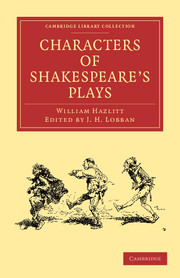Book contents
- Frontmatter
- Preface
- Contents
- Introduction
- Preface
- Cymbeline
- Macbeth
- Julius Cæsar
- Othello
- Timon of Athens
- Coriolanus
- Troilus and Cressida
- Antony and Cleopatra
- Hamlet
- The Tempest
- The Midsummer Night's Dream
- Romeo and Juliet
- Lear
- Richard II
- Henry IV
- Henry V
- Henry VI
- Richard III
- Henry VIII
- King John
- Twelfth Night; or, what you will
- The Two Gentlemen of Verona
- The Merchant of Venice
- The Winter's Tale
- All's Well That Ends Well
- Love's Labour's Lost
- Much Ado About Nothing
- As You Like It
- The Taming of the Shrew
- Measure for Measure
- The Merry Wives of Windsor
- The Comedy of Errors
- Doubtful plays of Shakespear
- Poems and Sonnets
- Notes
Poems and Sonnets
Published online by Cambridge University Press: 07 September 2010
- Frontmatter
- Preface
- Contents
- Introduction
- Preface
- Cymbeline
- Macbeth
- Julius Cæsar
- Othello
- Timon of Athens
- Coriolanus
- Troilus and Cressida
- Antony and Cleopatra
- Hamlet
- The Tempest
- The Midsummer Night's Dream
- Romeo and Juliet
- Lear
- Richard II
- Henry IV
- Henry V
- Henry VI
- Richard III
- Henry VIII
- King John
- Twelfth Night; or, what you will
- The Two Gentlemen of Verona
- The Merchant of Venice
- The Winter's Tale
- All's Well That Ends Well
- Love's Labour's Lost
- Much Ado About Nothing
- As You Like It
- The Taming of the Shrew
- Measure for Measure
- The Merry Wives of Windsor
- The Comedy of Errors
- Doubtful plays of Shakespear
- Poems and Sonnets
- Notes
Summary
Our idolatry of Shakespear (not to say our admiration) ceases with his plays. In his other productions, he was a mere author, though not a common author. It was only by representing others, that he became’ himself. He could go out of himself, and express the soul of Cleopatra; but in his own person, he appeared to be always waiting for the prompter's cue. In expressing the thoughts of others, he seemed inspired; in expressing his own, he was a mechanic. The licence of an assumed character was necessary to restore his genius to the privileges of nature, and to give him courage to break through the tyranny of fashion, the trammels of custom. In his plays, he was “as broad and casing as the general air;” in his poems, on the contrary, he appears to be “cooped, and cabined in” by all the technicalities of art, by all the petty intricacies of thought and language, which poetry had learned from the controversial jargon of the schools, where words had been made a substitute for things. There was, if we mistake not, something of modesty, and a painful sense of personal propriety at the bottom of this. Shakespear's imagination, by identifying itself with the strongest characters in the most trying circumstances, grappled at once with nature, and trampled the littleness of art under his feet: the rapid changes of situation, the wide range of the universe, gave him life and spirit, and afforded full scope to his genius; but returned into his closet again, and having assumed the badge of his profession, he could only labour in his vocation, and conform himself to existing models.
- Type
- Chapter
- Information
- Characters of Shakespeare's Plays , pp. 257 - 261Publisher: Cambridge University PressPrint publication year: 2009First published in: 1908



